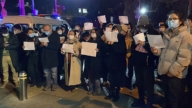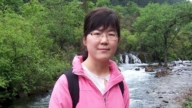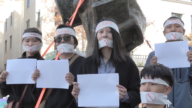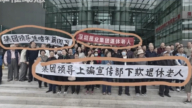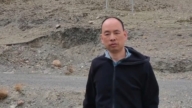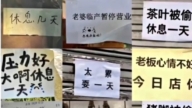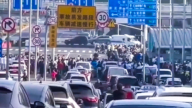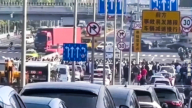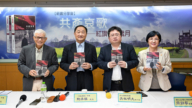【新唐人2013年11月12日訊】台灣海峽兩岸國、共兩黨,11月10號分別舉行會議。台灣國民黨第19次全國代表大會,與中共十八屆三中全會同一個時間召開,雖然國、共雙方保安都很嚴密,但國民黨全代會會場外的「萬鞋齊發」,和北京三中全會舉辦地「京西賓館」外的草木皆兵,形成強烈反差。有評論認為,在台灣的民主機制下,老百姓擁有集會抗議的權利,而國民黨遭遇台灣民眾「用鞋投票」的抗議,「令共產黨感受到的恐懼,不亞於當年蘇共垮臺。」
中共十八屆三中全會的會議地點,是隸屬於中共軍隊總參謀部的「京西賓館」,地處軍事博物館、國防部和幾個軍營附近,極具軍事安全性。三中全會召開期間,會場周邊更是草木皆兵,戒備森嚴。官方媒體並沒有就這次會議進行相關報導,外界認為這屆三中全會為「閉門會議」。
時事評論員夏小強:「中共召開會議竟然像當年中共奪取政權前的地下黨一樣,偷偷摸摸的不敢見光,主要原因中共召開會議的實質並不是真正的所謂改革,本質上是中共內部的一場內訌,要完成中共內部的一場權力和利益的重新分配轉移,對中國社會和民眾沒有任何好處。」
台灣民主基金會副執行長董立文:「中共雖然提出向政府開刀的改革方案,但這次的三中全會的召開,其實是比過去任何一次都更神秘的,整場並沒有開放給媒體,也史無前例的跑到軍方所開的一個飯店裡面,也是躲起來開。」
與此同時,台灣海峽對岸的執政黨——國民黨,原定今年9月29號在臺北舉行第19次全國代表大會,卻因為社運團體計劃進行抗議活動,而延後到11月10號,並且到中部舉行。
董立文:「那在我們台灣這個民主自由的社會,其實我也沒想到這種事情也會發生在我們台灣,就是執政黨在召開一個全會,就因為人民的反應,它逃離了,它躲開了,躲到臺中去開了,結果它還是躲不掉,我覺得這就是兩邊,兩岸最大的對照。」
國民黨10號舉行的全代會當天,會場外大批不滿的示威群眾朝封鎖區內丟鞋,象徵人民「用鞋投票」,來抗議國民黨主席馬英九所領導的台灣政府。
夏小強:「國民黨開黨代會遭到萬鞋齊發,表明民眾對執政黨的不滿,國民黨只能通過改變施政中的不當和失誤,來換取民眾的認同支持。相反,中共這樣的獨裁政府和民眾的根本利益是根本對立的,中共面對訪民的上訪和抗議,採用的是抓捕、關押和迫害。」
根據日本《時事通訊社》報導,中共十八屆三中全會雖然討論全面深化改革,但大陸的社會弱勢民眾已對官員貪腐和司法不公憤怒到極點。報導說,三中全會開幕時,在北京西城區的監察部外,出現了超過1000名來自全大陸上訪民眾的示威場面。
《時事通訊社》認為,在三中全會開幕當天的戒嚴狀況下,仍有如此大規模抗議行動,實屬意外。而訪民透露,他們是透過網路和手機互通郵件,來實現團結下的示威力量,如果幾個人示威,馬上就會被抓走,可是很多人在一起,那就有可能成功。
美國紐約城市大學政治學教授夏明:「就是中國沒有保障老百姓民主抗議集會的權利,所以老百姓其實是冒著很大的生命危險。而相反的,在台灣就已經形成一個民主的機制,那麼這種抗議集會,成了老百姓的根本權利。」
在台灣的「中華民國」人民不但可以合法的舉行抗議遊行集會,即使部份民眾逾時非法集會抗議,政府也只命令警察柔性勸導。反觀中國大陸,訪民舉橫額抗議,最終遭到警察驅趕,並抓到被稱為「信訪集中營」的「久敬莊」關押。
採訪/常春 編輯/黃億美 後製/孫寧
Contrasting China’s Two Party Conferences:
Thousands of Shoes, Thousands of Police
The Chinese Nationalist Party, or Kuomintang (KMT)
in Taiwan, and the Chinese Communist Party (CCP)
in the mainland are divided by the Taiwan Strait.
On November 10, the Taiwan KMT 19th National
People’s Congress opened at the same time
as the CCP 18th Third Plenary Session.
Both have tight security control measures.
Outside the KMT conference hall, protestors
threw thousands of shoes in demonstrations.
This was in stark contrast to the atmosphere outside “Jingxi
Hotel", where the CCP Third Plenary Session was being held.
Protesters were met with violence and arrests.
Commentators believe that, under Taiwan’s democratic
institution, people have the right to protest, and the KMT
suffered from Taiwanese people “voting with shoes".
The fear felt by the CCP is no less
than when the Soviet Union collapsed.
The 18th Third Plenary Session’s meeting
place is Jingxi Hotel, which belongs to the
CCP military General Staff Headquarters.
The hotel is close to the Military Museum, the
Defense Department and several military barracks.
During the session, the area surrounding the
hotel was heavily guarded, with a tense atmosphere.
Chinese state media did not report about the meeting,
and internationally appears to be a “closed-door" meeting.
Xia Xiaoqiang, Political commentator:
“This meeting resembles the underground
nature the CCP took before it seized power.
It is very sneaky and afraid of light.
I think the main reason is that the meeting
isn’t about reforms, but rather about infighting.
It is to complete a redistribution of
power and interests within the party.
This is not beneficial at all to Chinese society or it’s people."
Dong Liwen, Deputy Executive Director, Taiwan
Foundation for Democracy: “The CCP has proposed a
reform plan that points a knife towards it’s governance.
However, the Third Plenary Session
could not be more mysterious.
It is not opened to the media, and is also being
held in a military hotel, where they hide away."
Across the Taiwan Strait, the KMT National
People’s Congress was postponed.
It was moved from September 29 to November 10.
This was due to planned protests by social movement groups.
The meeting venue was also changed to central Taiwan.
Dong Liwen: “I did not expect to see this happen
under Taiwan’s democratic and free society.
The ruling party escaped and hid in the middle of Taiwan.
This is because of people’s reaction,
and in the end it could not escape.
I believe this is the biggest contrast
between Taiwan and China."
On November 10, when the KMT held it’s
congress, a large number of people
were throwing shoes into restricted areas.
This is a symbol of people “voting with shoes", to protest
against the KMT Chairman Ma Ying-jeou’s government.
Xia Xiaoqiang: “When the KMT was met with thousands
of shoes from protestors showing their dissatisfaction, it can
only change it’s mistakes in order to gain public support.
On the contrary, when the CCP dictatorship
meets with protestors and petitioners, it reacts
by arresting, detaining and persecuting people."
The CCP discussed comprehensive deepening
of reforms ahead of the Third Plenum being held.
However, the anger felt by socially vulnerable
people towards corrupted officials and judicial
injustice have reached breaking point.
The report says that at the closure of the session, more
than one thousand mainland petitioners protested outside
the Ministry of Supervision in Beijing Xicheng district.
“Jiji Press" highlights that even under strict controls during the
opening of the session, there were such large scale protests.
Petitioners revealed that they communicate through the
internet and mobile phones to unite and gain strength.
If there are only a few protesters, they could
be arrested immediately, but if there are
many people protesting, it may succeed.
Xia Ming, Professor of Political Science, New York City
University: “Because China does not protect people’s
right to protest, people actually risk their lives to do so.
In contrast, Taiwan has formed a democratic system,
so protests and rallies have become people’s basic right."
In Taiwan, also known as the Republic of China, it
is not only that people can legally protest and rally.
The government also orders the police to use persuasion.
In mainland China, petitioners who hold
banners are chased and arrested by police.
They are taken to a place called “Jiujingzhuang",
which is also known as “the petitioners camp".


